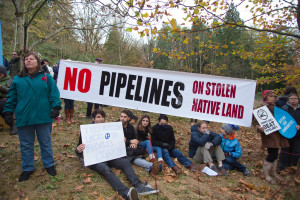
The battle for the Dakota Access pipeline is not the only pipeline fight in North America. Later today, the Canadian cabinet of Prime Minister, Justin Trudeau, is expected to review the evidence from a special Ministerial Panel on the highly controversial Kinder Morgan pipeline.
The cabinet is expected to say yes to the pipeline, sparking a new round of legal and other protests. It has already made up its mind, but now has to make its decision public.
A final decision on the pipeline proposal, which will triple the amount of tar sands oil that can be transported to the coast, has to be made by December 19 this year. If built the pipeline would transport just under 900,000 barrels of tar sands crude from Alberta.
As the deadline approaches, opposition to the pipeline amongst First Nations and others remains resolute and is growing by the day.
Earlier this month, a protest in Vancouver saw several thousand congregate calling for the pipeline proposal to be scrapped. Other demonstrations were held across the country.
On Monday the 24th, 99 young people were arrested on Parliament Hill. The following day, over a dozen young people turned their backs on Trudeau during the Young Worker’s Summit in Ottawa.
The opposition to Kinder Morgan was passionately in evidence yesterday when leaders of the Tsleil-Waututh Nation met with Canada’s Natural Resources Minister, Jim Carr. They had travelled from their traditional territory, the Burrard Inlet off the coast of Vancouver for the crunch meeting,
Afterwards, Chief Maureen Thomas said: “We’re fighting for the survival of the Tsleil-Waututh Nation,” or People of the Inlet.
She added: “When we make decisions, it is not for today, it is for tomorrow and the days to come. I find, with the federal government, the decisions they make are for today. We need to find a way to bring the two minds together.”
Rueben George, the community’s spokesman, added: “We’ll do what it takes legally to stop it. We’ll do what it takes to stop it, period,” he said. “We’re taking a stand, that’s why we say no.”
Their verbal sentiments reiterated the main points of a letter which was sent by Thomas a few days earlier. It read in part: “The Project, if approved, would constitute a serious, unjustified infringement of our Aboriginal title and rights in Eastern Burrard Inlet for generations to come.”
The letter continued: “It would expose our people and our territory to serious risks associated with oil spills and other concerns related to marine shipping, all of which we have communicated to your representatives and substantiated with scientific studies.”
But the conditions for the pipeline have radically changed. A recently completed panel review for Ottawa, headed by former Tsawwassen chief Kim Baird, reported earlier this month: “The conditions that prevailed when the project was first proposed have changed, and many of the circumstances that may affect the need for — and impact of the project over time are also uncertain.”
Ironically one of them was Trudeau’s own 2015 election campaign declaration that “governments might grant permits, but only communities grant permission”.
Trudeau’s climate choice is the subject of a petition by the Council of Canadians, which is warning that “building any new pipeline would set us on a path to increased dependence on fossil fuels and put the coast and water at risk.”
It continues: “The Trudeau government is faced with a choice: approve this pipeline and side with Big Oil’s push to export fossil fuels no matter what the cost, or reject Kinder Morgan’s application and take real climate action and protect water.”
